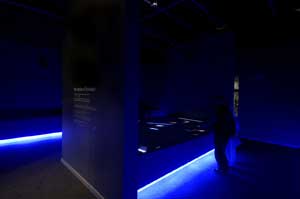
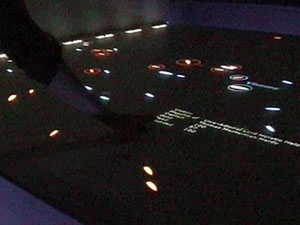
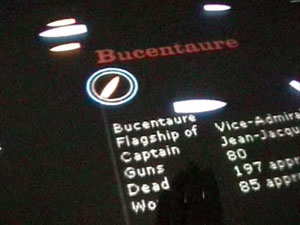
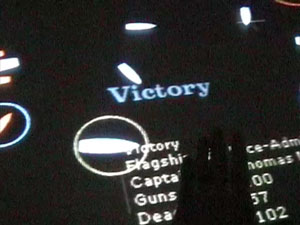
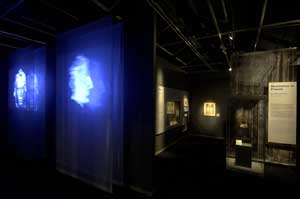
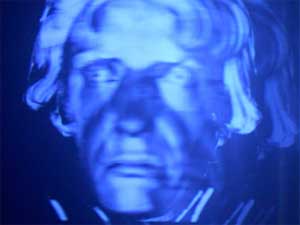
Nelson and Napoleon for Greenwich Maritime Museum
partners
Ralph Appelbaum associates UK, tomato
the brief
To celebrate the 200th anniversary of the battle of Trafalgar the National Maritime Museum in Greenwich held a major ticketed exhibition titled ‘Nelson and Napoleon’ designed by Ralph Appelbaum Associates. Rom and Son were comissioned to create several installations for the show including one of the centrepieces of the exhibiton, an interactive animated map of the battle itself.
Battle map table
The battle of Trafalgar involved over sixty saling ships engaged in complex maneuvers and vicious fighting over many hours. The battle table presents a 4 metre wide video projected top down view of the battle. Time is compressed and the view zooms and pans to follow the action, a voice over and surround sound audio effects both explain the unfolding events and provide dramatic atmosphere. The table also features an infrared tracking system which allows users to interact with the map of the battle as it is happening. Simply by pointing at ships on the table users create a ‘ray’ across the table surface which they can move with their hand. Pointing this ray at any of the ships on the map displays a readout of information about that ship and its role in the battle. In this way the table provides both a compelling narrative experience and an easily comprehensible view of the tactics used in the battle as well as layers of more detailed information. At least ten people can interact with this exhibit at once.
Foyer head projections
On entering the exhibition visitors come face to face with its two protagonists. We created two very large animated projections of the heads of Nelson and Napoleon which were built using 3D data scanned from busts in the museum’s collection. The slowly revolving heads were projected onto multiple layers of translucent fabric to give a three dimensional holographic effect.
Audio stairwell
Halfway through the Nelson and Napoleon exhibition visitors descend through a stairwell between two floors. Rom and son built an audio installation for the stairwell consisiting of a series of speakers spaced down the stairs to create a 3 dimensional sound space. Moving down the stairs visitors are approaching the section of the exhibition which deals with the battle of Trafalgar itself. On the way down domestic sounds of the period give way to the rumbling of the sea and cries of gulls, and finally the crashing and screams of a naval battle. The installation builds anticipation and makes the trip down the stairwell into an important part of the exhibition’s narrative flow.
